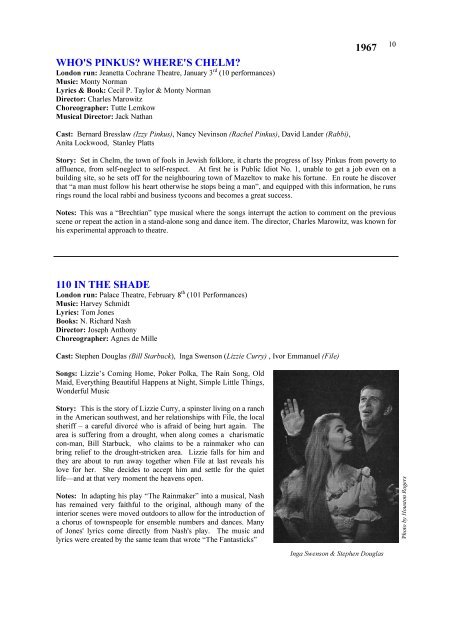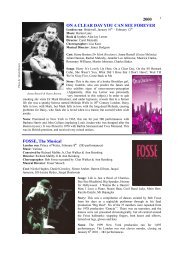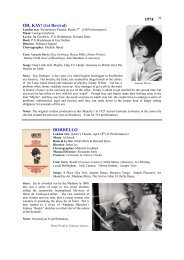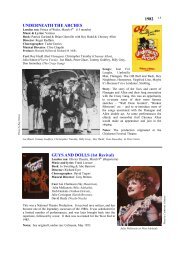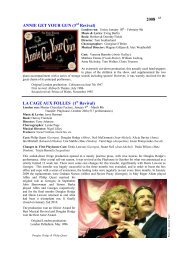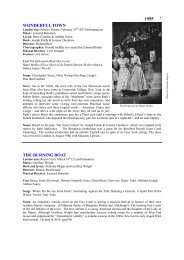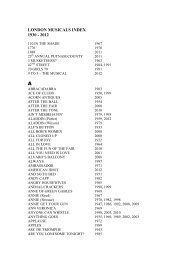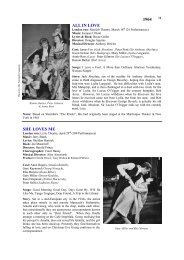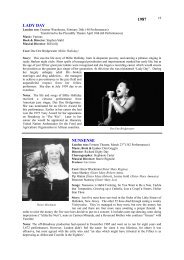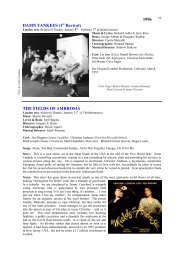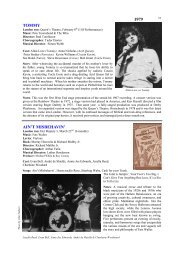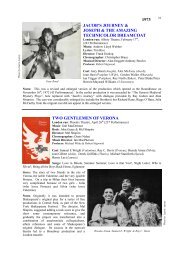London Musicals 1965-1969.pub - Over The Footlights
London Musicals 1965-1969.pub - Over The Footlights
London Musicals 1965-1969.pub - Over The Footlights
Create successful ePaper yourself
Turn your PDF publications into a flip-book with our unique Google optimized e-Paper software.
WHO'S PINKUS? WHERE'S CHELM?<br />
<strong>London</strong> run: Jeanetta Cochrane <strong>The</strong>atre, January 3 rd (10 performances)<br />
Music: Monty Norman<br />
Lyrics & Book: Cecil P. Taylor & Monty Norman<br />
Director: Charles Marowitz<br />
Choreographer: Tutte Lemkow<br />
Musical Director: Jack Nathan<br />
Cast: Bernard Bresslaw (Izzy Pinkus), Nancy Nevinson (Rachel Pinkus), David Lander (Rabbi),<br />
Anita Lockwood, Stanley Platts<br />
1967<br />
10<br />
Story: Set in Chelm, the town of fools in Jewish folklore, it charts the progress of Issy Pinkus from poverty to<br />
affluence, from self-neglect to self-respect. At first he is Public Idiot No. 1, unable to get a job even on a<br />
building site, so he sets off for the neighbouring town of Mazeltov to make his fortune. En route he discover<br />
that “a man must follow his heart otherwise he stops being a man”, and equipped with this information, he runs<br />
rings round the local rabbi and business tycoons and becomes a great success.<br />
Notes: This was a “Brechtian” type musical where the songs interrupt the action to comment on the previous<br />
scene or repeat the action in a stand-alone song and dance item. <strong>The</strong> director, Charles Marowitz, was known for<br />
his experimental approach to theatre.<br />
110 IN THE SHADE<br />
<strong>London</strong> run: Palace <strong>The</strong>atre, February 8 th (101 Performances)<br />
Music: Harvey Schmidt<br />
Lyrics: Tom Jones<br />
Books: N. Richard Nash<br />
Director: Joseph Anthony<br />
Choreographer: Agnes de Mille<br />
Cast: Stephen Douglas (Bill Starbuck), Inga Swenson (Lizzie Curry) , Ivor Emmanuel (File)<br />
Songs: Lizzie’s Coming Home, Poker Polka, <strong>The</strong> Rain Song, Old<br />
Maid, Everything Beautiful Happens at Night, Simple Little Things,<br />
Wonderful Music<br />
Story: This is the story of Lizzie Curry, a spinster living on a ranch<br />
in the American southwest, and her relationships with File, the local<br />
sheriff – a careful divorcé who is afraid of being hurt again. <strong>The</strong><br />
area is suffering from a drought, when along comes a charismatic<br />
con-man, Bill Starbuck, who claims to be a rainmaker who can<br />
bring relief to the drought-stricken area. Lizzie falls for him and<br />
they are about to run away together when File at last reveals his<br />
love for her. She decides to accept him and settle for the quiet<br />
life—and at that very moment the heavens open.<br />
Notes: In adapting his play “<strong>The</strong> Rainmaker” into a musical, Nash<br />
has remained very faithful to the original, although many of the<br />
interior scenes were moved outdoors to allow for the introduction of<br />
a chorus of townspeople for ensemble numbers and dances. Many<br />
of Jones' lyrics come directly from Nash's play. <strong>The</strong> music and<br />
lyrics were created by the same team that wrote “<strong>The</strong> Fantasticks”<br />
Photo by Houston Rogers<br />
Inga Swenson & Stephen Douglas
WILL SOMEBODY PLEASE SAY SOMETHING?<br />
<strong>London</strong> run: Arts <strong>The</strong>atre, February 14 th (12 Performances)<br />
Music: David Allen<br />
Lyrics & Book: David Baxter<br />
Director: David Calderisis<br />
Cast: Stephen Moore (Webster), David Baxter (Trebor), Susan Baxter (Girl)<br />
1967<br />
11<br />
Songs: Isn’t She a Lovely Child, Baby the Good Times Are Coming at Last, I’m the Kind of Girl, I’m in Love,<br />
<strong>The</strong> Only Good Thing,<br />
Notes: Not a musical, but a three-hander “play with songs”. It seems to have come and gone within two<br />
weeks despite being chosen by Plays & Players for a full-text publication in their April 1967 issue.<br />
FIDDLER ON THE ROOF<br />
<strong>London</strong> run: Her Majesty's, February 16 th (2,030 Performances)<br />
Music: Jerry Bock<br />
Lyrics: Sheldon Harnick<br />
Book: Joseph Stein<br />
Director-Choreographer: Jerome Robbins<br />
Musical Director: Gareth Davies<br />
Producer: Harold Prince & Richard Pilbrow<br />
Cast: Topol (Tevye), Miriam Karlin (Golde), Cynthia Greville (Yente),<br />
Paul Whitsun-Jones (Lazar Wolf). Sandor Eles (Perchick),<br />
Rosemary Nicols (Tzeitel), Jonathan Lynn (Motel), Caryl Little (Chava)<br />
Songs: Tradition, Matchmaker Matchmaker, If I Were a Rich Man, To Life,<br />
Sunrise Sunset, Miracle of Miracles, Anatevka<br />
Story: Set in 1905 in Czarist Russia, the story focuses on Tevye the milkman, his wife, Golde and their three<br />
daughters in the Jewish village of Anatevka. <strong>The</strong> eldest daughter, Tzeitel, marries a poor tailor even though<br />
Tevye had promised her to the rich, middle-aged butcher, Lazar Wolf. <strong>The</strong> second daughter, Hodel, marries a<br />
young revolutionary who is sent to Siberia. <strong>The</strong> third daughter, Chava, marries outside the faith. At the play's<br />
end the police destroy the village during a pogrom and Tevye and what's left of his family are forced to begin a<br />
new life in America.<br />
Note: Based on the stories of Sholem Aleichem,<br />
this was a musical offering neither attractive<br />
costumes nor pretty scenery, and yet its theme of a<br />
people vainly trying to preserve tradition in a<br />
changing world proved to be enormously popular.<br />
On Broadway it became the longest-running show<br />
up to that time. Topol and Miriam Karlin played<br />
the leading roles in <strong>London</strong> for the first year, and<br />
then were replaced with Alfie Bass and Avis<br />
Bunnage. Alfie Bass remained with the show for<br />
the rest of the run, with occasional temporary<br />
replacements by Les Goudsmit. Avis Bunnage<br />
stayed a further eighteen months and was replaced<br />
by Hy Hazell. Sadly Hy Hazell suddenly died ,<br />
aged 48, after ten months in the role. Avis<br />
Bunnage returned for the remainder of the run.<br />
Topol & Miriam Karlin<br />
Photo by Zoe Dominic
OLIVER (1 st Revival)<br />
<strong>London</strong> run: Piccadilly <strong>The</strong>atre, April 26 th (331 Performances)<br />
Music, Lyrics, Book: Lionel Bart<br />
Director: David Phethean<br />
Musical Director: Michael Moores<br />
Producer: Donald Albery<br />
1967<br />
12<br />
Cast: Barry Humphries (Fagin), Marti Webb (Nancy), Martin Dell (Bill Sykes), Paul Bartlet (Oliver),<br />
Leslie Stone (Artful Dodger), Tom de Ville (Mr Bumble), Pamela Pitchford (Widow Corney),<br />
Glyn Worsnip (Mr Sowerberry)<br />
Notes: See New <strong>The</strong>atre, June 1960 for original <strong>London</strong> production.<br />
THE DESERT SONG (5 th Revival)<br />
<strong>London</strong> run: Palace <strong>The</strong>atre, May 13 th (383 Performances)<br />
Music: Sigmund Romberg<br />
Lyrics: Otto Harbach, Oscar Hammerstein, & Frank Mandel<br />
Director: Joan Davis<br />
Choreographer: Virginia Courtney<br />
Musical Director:<br />
Cast: John Hanson (Pierre Birabeau), Patricia Michael (Margot Bonvalet),<br />
Tony Hughes (Bennie Kidd), Lita Scott (Azuri), Dermod Gloster (Sid el Kar),<br />
Raymond du Parc ( Capt Paul Fontaine), Carol Dorée (Clementina),<br />
Doreen Key (Susan)<br />
Songs: <strong>The</strong> Desert Song, <strong>The</strong> Riff Song, Romance, One Alone, One Flower Grows<br />
Alone in Your Garden, I Want a Kiss, It, <strong>The</strong> French Marching Song.<br />
Story: In North Africa the French occupying forces are striving to capture the Red Shadow, who is the leader<br />
of the Riffs, an outlaw band of Moroccan tribesmen. <strong>The</strong> famous renegade is in love with Margot, but she is<br />
infatuated with Pierre Birabeau, the handsome son of the French Governor. Margot is captured by the<br />
mysterious Red Shadow and eventually falls in love with him,<br />
although she does not know his identity – his face is always hidden<br />
from her. However, the Red Shadow is himself captured and<br />
imprisoned by the governor's soldiers, and only then does Margot<br />
discover the Red Shadow is really Pierre in disguise. All ends<br />
happily.<br />
Notes: <strong>The</strong> original <strong>London</strong> production had been at Drury Lane in<br />
1927, and due to its enormous popularity it was revived in the West<br />
End in 1931, 1936, 1939 and 1943. From the late 1950s onwards the<br />
actor-singer John Hanson had headed a semi-permanent UK touring<br />
company presenting “<strong>The</strong> Desert Song” and other popular operettas.<br />
He had played the Red Shadow over 600 times before finally<br />
bringing his company into the West End.<br />
Photo by Dezo Hoffmann Ltd<br />
It was inevitable that the critics would sneer at the “provincial”<br />
scenery, costumes and production, and a fair bet that more than one<br />
of them would go for “No Great Sheikhs” as a title for the review,<br />
but John Hanson was enormously popular with the coach-party trade,<br />
and he succeeded in filling the vast Palace <strong>The</strong>atre for the best part of<br />
a year.<br />
John Hanson
QUEENIE<br />
<strong>London</strong> run: Comedy <strong>The</strong>atre, June 22 nd (20 Performances)<br />
Music: Ted Manning & Marvin Laird<br />
Lyrics & Book: Ted Willis<br />
Director: Arthur Lewis<br />
Choreographer: Leo Kharibian<br />
Musical Director: Leo Mole<br />
Producer: Bernard Delfont & Arthur Lewis<br />
Cast: Vivienne Martin (Queenie) ,Kevin Colson (James) , Bill Owen (Tom),<br />
Simon Oates (Dick), Paul Eddington (Harry)<br />
1967<br />
13<br />
Songs: Here is the Key of the Door, We’re Gonna Be Dead and Gone, Special Kind of Man, How Does He<br />
Look in the Morning?, Excuse Me for Speaking My Mind.<br />
Story: This was the ballad tale of a young widow, the landlady of the Queen of Sheba public house, and her<br />
attempts to re-marry. She has her heart set on James, her barman, and to try and get him to propose to her, she<br />
pretends to take on a succession of three “trial” husbands: Tom, Dick and Harry. A sub-plot involves the love<br />
affair of a much younger couple.<br />
Notes: This “ballad-opera” began life as a short TV play – claimed to be the first ever play written entirely in<br />
verse. <strong>The</strong> musical adaptation retained the rhyming couplets in an attempt to re-create the “ballad” feel.<br />
However, the critics claimed the effect was similar to an exceptionally bad pantomime script. <strong>The</strong> show failed<br />
after 20 performances.<br />
ANNIE<br />
<strong>London</strong> run: Westminster <strong>The</strong>atre, July 27 th (156 Performances)<br />
Revived February 1 st 1968 ( 242 Performances)<br />
Music: William L. Reed<br />
Lyrics & Book: Alan Thornhill<br />
Director: Henry Cass<br />
Choreographer: Denny Bettis<br />
Musical Director: Ray Cook<br />
Cast: Margaret Burton (Annie Jaeger), Bill Kenwright (Bill Jaeger),<br />
Donald Simpson, Norman Ghent, Angela Richards.<br />
Songs: I Don’t Like Your Hat, It Fair Takes Your Breath Away, I Keeps Myself to<br />
Myself, Who’s the Dictator Jim Parks?, We’re Going to Shake the Country, A<br />
Basinful of Revolution.<br />
Story: <strong>The</strong> life story of Annie Jaeger, an early member of the Moral Rearmament Movement, was the subject<br />
of this musical, starting with her leaving her comfortable home surroundings in 1930s Stockport, and coming to<br />
<strong>London</strong> to spread her message of moral rearmament amongst the people of the capital.<br />
Notes: With its preachy message and parable-like scenes and songs, it was clearly not aimed at the ordinary<br />
theatre-going public, but specifically at supporters of the Moral Rearmament Movement. It turned out that<br />
there were more supporters than one might have thought: after a four and half month run, it was withdrawn for<br />
the planned Christmas show at the Westminster, and then revived in February 1968 for a further six month run.<br />
<strong>The</strong>re were a few minor cast changes for the 1968 production.
SWEET CHARITY<br />
<strong>London</strong> run: Prince of Wales <strong>The</strong>atre, October 11 th (476 Performances)<br />
Music: Cy Coleman<br />
Lyrics: Dorothy Fields<br />
Book: Neil Simon<br />
Director: Bob Fosse, restaged by Lawrence Carr<br />
Choreographer: Bob Fosse, reproduced by Robert Linden<br />
Musical Director: Alyn Ainsworth<br />
Producer: Bernard Delfont & Harold Fielding<br />
1967<br />
14<br />
Cast: Juliet Prowse (Charity), Rod McLennan (Oscar) ,<br />
John Keston (Vittorio Vidal) Josephine Blake, Paula Kelly, Fred Evans,<br />
Songs: Hey Big Spender, If My Friends Could See<br />
Me Now, <strong>The</strong>re's Gotta Be Something Better Than<br />
This, Rhythm of Life, I'm a Brass Band, I Love to<br />
Cry at Weddings<br />
Rod McLennan & Juliet Prowse<br />
Story: Charity Hope Valentine works as a dime-adance<br />
hostess at the Fan-Dango Ballroom. Her trusting, romantic nature gets her<br />
involved with an Italian screen star, Vittorio Vidal, and with a “square” named Oscar<br />
whom she meets when they are stuck in an elevator at the 92 nd Street “Y”. Later they<br />
also get stuck on a Coney Island Ferris wheel. Though Oscar promises to marry<br />
Charity, he backs out, and she returns to the Fan-Dango, living “hopefully ever after”<br />
Notes: Based on Fellini's film “Nights of Cabiria”, the South-African born actress Juliet<br />
Prowse gained a great personal success in the <strong>London</strong> production.<br />
Photo by Tom Hustler<br />
MRS WILSON’S DIARY<br />
<strong>London</strong> run: Criterion, October 24 th (175 Performances)<br />
Music: Jeremy Taylor<br />
Lyrics: John Wells<br />
Book: Richard Ingrams & John Wells<br />
Director: Joan Littlewood<br />
Cast: Bill Wallis (Harold Wilson), Myvanwy Jenn (Gladys Mary Wilson),<br />
Bob Grant (George Brown), Peter Reeves (Gerald Hoffman),<br />
Sandra Caron (Audrey Callaghan), Johnny Lyons (Jim Callaghan),<br />
Carl Forgione (David Frost), Kevin Smith (President Johnson)<br />
Unknown credit<br />
Bob Grant as George Brown<br />
Songs: Here I Kneel, Who Are the Bastards Now?, <strong>The</strong> Terrible Mr Brown, Why<br />
Should I Worry?, Harold and Me<br />
Notes:: This was a piece of gentle political satire based on the on-going lampoons in<br />
the fortnightly magazine “Private Eye”. It was not really a musical – it was a satirical<br />
play laced with some rather funny songs. It originally opened at the <strong>The</strong>atre Royal<br />
Stratford on September 21 st and quickly transferred.<br />
THE BOY FRIEND ( 1 st Revival)<br />
<strong>London</strong> run: Comedy <strong>The</strong>atre, November 29 th (365 Performances)<br />
Music & Lyrics : Sandy Wilson<br />
Director: Sandy Wilson<br />
Choreographer: Noel Tovey<br />
Musical Director: Grant Hossack<br />
Producer: Michael Codron<br />
Cast: Ann Beach (Hortense), Cheryl Kennedy (Polly Browne), Tony Adams (Tony),<br />
Nicholas Bennett (Bobby van Husen), Frances Barlow (Maisie),<br />
Marion Grimaldi (Mme Dubonnet)<br />
Notes: See Original <strong>London</strong> production, Wyndham’s, January 1954
A PRESENT FROM THE CORPORATION<br />
<strong>London</strong> run: Fortune <strong>The</strong>atre, November 30 th (3 performances)<br />
Music: John Gould<br />
Lyrics: David Wood<br />
Director: David Wood<br />
Musical Director: John Gould<br />
1967<br />
15<br />
Cast: Terence Brady (Graham Slater), Julia McKenzie (Maggie Slater), John Gower, Gay Soper,<br />
Michael Boothe, Sam Walters.<br />
Story: Graham Slater and his wife Maggie move to a Northern town, where Graham has been appointed<br />
Cultural Officer. <strong>The</strong>y are met with a very cold response from a community that feels “arty, fancy” ideas from<br />
the south are not welcome.<br />
Notes: <strong>The</strong> original production ran for two weeks in rep at the Swan <strong>The</strong>atre, Worcester. <strong>The</strong> local<br />
theatregoers loved the show so much they contributed towards a fund to bring the show to <strong>London</strong>'s Fortune<br />
<strong>The</strong>atre for a three performance “showcase” in the hope it would attract a management to take on the show and<br />
give it a full West-End production. Sadly, no management was interested.<br />
THE FOUR MUSKETEERS<br />
<strong>London</strong> run: Drury Lane, December 5 th (462 Performances)<br />
Music: Laurie Johnson<br />
Lyrics: Herbert Kretzmer<br />
Director: Peter Coe<br />
Choreographer: Donald MacKayle<br />
Musical Director: Derek New<br />
Producer: Bernard Delfont<br />
Cast: Harry Secombe (D'Artagnan), Jeremy Lloyd (Porthos), Glyn Owen (Athos),<br />
John Junkin (Aramis), Stephanie Voss (Constance), Elisabeth Larner (Milady),<br />
Kenneth Connor (King Louis XIII)<br />
Songs: A Little Bit of Glory, Think Big, What Love Can Do, Nobody's Changing<br />
Places With Me, Give Me a Man's Life<br />
Story: D'Artagnan, a countrified gentleman, achieves all his deeds of daring by pure accident. Coming to<br />
Paris in search of his beloved Constance, he meets up with the three musketeers of Dumas's story – except here<br />
they are drunken and lecherous rioters – and then he is asked to go to Baden-Baden to retrieve a diamond from<br />
the Queen's former lover (a necessary act if the Queen is to be saved from disgrace and scandal). <strong>The</strong> bumbling<br />
adventures and mishaps all manage to end up bringing praise, success and a brave reputation to a man who is,<br />
at heart, a good-natured country bumpkin.<br />
Notes: <strong>The</strong> show was in trouble from the start: there were many re-writes and several cast changes and walkouts<br />
during rehearsals, including opera star Joyce Blackham, replaced at short notice by Elizabeth Larner. A<br />
great deal of money had been lavished on the production, but the critics found the sets (Sean Kenny) ugly and<br />
impractical, the costumes (Loudon Sainthill) dull. <strong>The</strong> dialogue was said to be infantile, the music a total mishmash<br />
of inappropriate operatic<br />
numbers for Harry Secombe and<br />
silly, sentimental or comedy<br />
numbers, none of which seemed to<br />
belong together. <strong>The</strong> only merit<br />
was Harry Secombe himself, and<br />
his presence in the cast managed to<br />
keep the show afloat for fourteen<br />
months. However, it never<br />
recovered its costs and ended up<br />
with a loss of £50,000.<br />
Harry Secombe & Elizabeth Larner<br />
Photo by John Timbers
1968<br />
YOU’RE A GOOD MAN, CHARLIE BROWN<br />
<strong>London</strong> run: Fortune <strong>The</strong>atre, February 1 st (116 Performances)<br />
Music & Lyrics: Clark Gesner<br />
Book: “John Gordon” (Clark Gesner)<br />
Director: Joseph Hardy<br />
Choreographer: Patricia Birch<br />
Musical Director: Peter Martin<br />
Producer: Bernard Delfont & Harold Fielding<br />
16<br />
Photo by Tom Hustler<br />
Gene Scandur & Courtney Lane<br />
Cast: Gene Kidwell (Linus), David Rhys Anderson (Charlie Brown),<br />
Courtney Lane (Patty), Gene Scandur (Schroeder), Don Potter (Snoopy),<br />
Boni Enten (Lucy)<br />
Songs: My Blanket and Me, Book Report, T.E.A.M., Suppertime,<br />
Happiness<br />
Notes: This is an average day in the life of Charlie Brown, based on the<br />
comic strip “Peanuts” by Charles Schulz. Charlie flies his kite, writes a<br />
book report for school, plays baseball, and meets up with his friends, the<br />
piano-playing Schroeder, the bossy Lucy, the blanket-loving Linus and<br />
the goggled canine Snoopy who imagines he’s the Red Baron. It managed<br />
just over a three month run.<br />
CABARET<br />
<strong>London</strong> run: Palace, February 28 th (336 Performances)<br />
Music: John Kander<br />
Lyrics: Fred Ebb<br />
Book: Joe Masteroff<br />
Director: Harold Prince<br />
Choreographer: Ron Field<br />
Producer: Harold Prince & Richard Pilbrow<br />
Cast: Judi Dench (Sally Bowles), Barry Dennen (MC), Kevin Colson (Clifford),<br />
Lila Kedrova (Fraulein Schneider), Peter Sallis (Herr Schultz), Richard Owens (Ernst Ludwig)<br />
Songs: Willkommen, Don’t Tell Mama, Tomorrow Belongs to<br />
Me, Two Ladies, If You Could See Her Through My Eyes,<br />
Cabaret, <strong>The</strong> Money Song<br />
Story: A bitter evocation of Berlin in the 1930s just as the Nazis<br />
are coming to power, this is the story of Sally Bowles, an aspiring<br />
but untalented English actress working in a seedy nightclub. She<br />
is involved in a doomed romance with a visiting American writer,<br />
Clifford Bradshaw. <strong>The</strong> story is told in tandem with performances<br />
at the Kit-Kat Club, presided over by a leering, sinister Master of<br />
Ceremonies.<br />
Notes: <strong>The</strong> original book was based on the “Berlin Stories” by<br />
Christopher Isherwood, and on John van Druten’s stage-play<br />
version of the stories, “I Am a Camera”. <strong>The</strong> musical<br />
significantly changed the nationality of the leading man from<br />
British to American, presumably for an “international” market.<br />
This was another show which did so much better in New York<br />
than in <strong>London</strong>: the Broadway show ran 1,165 performances<br />
compared to <strong>London</strong>’s 336.<br />
Judi Dench<br />
Photo by Zoe Dominic
CANTERBURY TALES<br />
<strong>London</strong> run: Phoenix, March 21 st (2,082 Performances)<br />
Music: Richard Hill & John Hawkins<br />
Lyrics: Nevill Coghill<br />
Book: Nevill Coghill & Martin Starkie<br />
Director: Martin Starkie & Vlado Habunek<br />
Choreographer: David Drew<br />
Musical Director: Gordon Rose<br />
Cast: James Ottaway (Chaucer), Nicky Henson (Squire, Nicholas, Alan, Damian),<br />
Pamela Charles (Prioress, Prosperina), Jessie Evans (Wife of Bath, Old Woman),<br />
Gay Soper (Alison), Kenneth J. Warren (Miller, Gervase, Pluto),<br />
Wilfrid Brambell (Steward, Carpenter, January), Trevor Bannister,<br />
Daniel Thorndike<br />
1968<br />
Songs: I Have a Noble Cock, <strong>The</strong>re’s the Moon, Some Call it Love, I’ll Give My Love a Ring, Love Will Conquer<br />
All, If She Has Never Loved Before, April Song.<br />
Notes: Based on Professor Nevill Coghill’s translation of Chaucer’s “Canterbury Tales”, the show primarily uses<br />
four of the tales: “<strong>The</strong> Miller’s Tale” (two students competing for an affair with the carpenter’s wife); “<strong>The</strong><br />
Merchant’s Tale” (the wife of a rich old man cheats on him with the young Squire); “<strong>The</strong> Steward’s Tale” (multiple<br />
bed-hopping in the house of the Miller) ; and “<strong>The</strong> Wife of Bath’s Tale” (a witch turns into a beautiful young girl to<br />
please an amorous Knight.) This was another example of how American and British musicals could differ: over<br />
2,000 performances in <strong>London</strong>, and just 121 when the show flopped on Broadway<br />
in 1969.<br />
17<br />
MAN OF LA MANCHA<br />
<strong>London</strong> run: Piccadilly <strong>The</strong>atre, April 24 th (253 Performances)<br />
Music: Mitch Leigh<br />
Lyrics: Joe Darion<br />
Book: Dale Wasserman<br />
Director: Albert Marre<br />
Choreographer: Jack Cole<br />
Musical Director: Denys Rawson<br />
Producer: Donald Albery<br />
Cast: Keith Michell (Don Quixote), Joan Diener (Aldonza),<br />
Bernard Spear (Sancho Panza), David King (Innkeeper), Alan Crofoot (Padre),<br />
Peter Arne (Dr Carrasco), Olive Gilbert (Housekeeper)<br />
Songs: Little Bird, It’s All the Same, Dulcinea, I Really Like Him,<br />
Golden Helmet of Mambrino, <strong>The</strong> Impossible Dream.<br />
Story: <strong>The</strong>re are two threads to the story: the first deals with Cervantes<br />
and his imprisonment for debts during the Spanish Inquisition, the<br />
second deals with the adventures of Don Quixote that Cervantes tells his<br />
fellow-prisoners. Most of the adventures deal with the Don’s love for the<br />
servant girl, Aldonza – whom he calls his Dulcinea – and his battles to<br />
save her honour. At the end, as the old man lies dying, he manages to<br />
convey to the girl his belief in dreaming the impossible dream.<br />
Notes: <strong>The</strong> show was adapted from Dale Wasserman’s TV play “I, Don<br />
Quixote”, which itself was based on the novel by Cervantes. It had a very<br />
long run in New York, playing 2,328 performances, almost ten times as<br />
long as the <strong>London</strong> run! In the Broadway production Richard Kiley<br />
played Quixote and gained great personal success. (He also appeared in<br />
a <strong>London</strong> revival – see June 1969) . Joan Diener came from America to<br />
repeat the role she had played in the original production.<br />
Bernard Spears and Keith Michell<br />
Photo by Anthony Crickmay
I DO! I DO!<br />
<strong>London</strong> run: Lyric <strong>The</strong>atre, May 16 th (115 Performances)<br />
Music: Harvey Schmidt<br />
Lyrics & Book: Tom Jones<br />
Director: Gower Champion (restaged by Lucia Victor)<br />
Musical Director: Ian MacPherson<br />
Producer: H. M. Tennent Ltd<br />
Cast: Anne Rogers, Ian Carmichael<br />
1968<br />
18<br />
Songs: I Love My Wife, My Cup Runneth <strong>Over</strong>, Love isn’t Everything,<br />
Nobody’s Perfect, <strong>The</strong> Honeymoon is <strong>Over</strong>, Where are the Snows?, When<br />
the Kids Get Married, Roll Up the Ribbons<br />
Story: With a cast of just two people, the show covers 50 years in the life of a married couple, Agnes and<br />
Michael, from their wedding day to the day they move out of their house. In between, they bring up a family,<br />
quarrel, threaten to break up, reconcile, plan for a life<br />
without children in the house, and reveal in song<br />
exactly what they mean to each other.<br />
Notes: Adapted from Jan de Hartog’s 1951 play “<strong>The</strong><br />
Fourposter”, a musical with a cast of just two was an<br />
enormous risk, though the New York production was<br />
helped by having two of Broadway’s biggest stars in<br />
the show – Mary Martin and Robert Preston. It ran for<br />
560 performances.<br />
Perhaps Anne Rogers and Ian Carmichael did not have<br />
the same pulling power in <strong>London</strong>, where the show<br />
was regarded as over-sickly and rather dull. It has<br />
become part of theatre folk-lore for the moment when<br />
during Act Two there was an offstage knock on the<br />
door, and a voice cried out from the front stalls “For<br />
God’s sake let them in – whoever it is!”<br />
Ian Carmichael & Anne Rogers<br />
Photo by Angus McBean<br />
CINDY<br />
<strong>London</strong> run: Fortune <strong>The</strong>atre, May 30 th (29 Performances)<br />
Music & Lyrics: Johnny Brandon<br />
Book: Joe Sauter & Mike Sawyer<br />
Director: Alexander Bridge<br />
Cast: Geraldine Morrow (Cindy Kreller), Johnny Tudor (Lucky), Kalman Glass (Irving Kreller),<br />
Hy Hazell (Zeuida Kreller), Dudley Stevens (Chuck Rosenfeld)<br />
Songs: Once Upon a Time, Is <strong>The</strong>re Something to What He Said?, A Genuine Feminine Girl, Cindy, Think<br />
Mink, Tonight's the Night, If You've Got It You've Got It, Got the World in the Palm of My Hand<br />
Story: This was a version of the Cinderella story, which had done quite well in New York but did not succeed<br />
in <strong>London</strong>.<br />
Notes: Originally an off-Broadway success in 1964, written by British performer Johnny Brandon (who had<br />
moved to the USA after appearing several West End shows, including a featured star role in “Love From<br />
Judy”). <strong>The</strong> English production played a week of previews at the Palace <strong>The</strong>atre Westcliff and moved into the<br />
Fortune. <strong>The</strong> critics hated it and it managed a run of just 29 performances.
1968<br />
GOLDEN BOY<br />
<strong>London</strong> run: Palladium, June 4 th (118 Performances)<br />
Music: Charles Strouse<br />
Lyrics: Lee Adams<br />
Book: Clifford Odets & William Gibson<br />
Director: Arthur Penn, re-staged by Michael Thoma<br />
Choreographer: Donald McKayle , re-staged by Jaime Rogers & Lester Wilson<br />
Musical Director: Shepherd Coleman<br />
19<br />
Cast: Sammy Davis (Joe Wellington), Gloria de Haven (Lorna Moon),<br />
Lon Satton (Eddie Satin), Mark Dawson (Tom Moody), Louis Basile (Roxy Gottlieb),<br />
Frank Nastasi<br />
Songs: Night Song, Everything’s Great. Don’t Forget 127 th Street, Lorna’s Here, This is the Life, While the<br />
City Sleeps, I Wanna Be With You<br />
Story: Joe Wellington, a Negro-American, is a young man determined to get out, get rich and make it to the<br />
top. Despite his family’s objections, he turns to boxing as a means of escaping his ghetto roots. He crosses<br />
paths with Mephistopheles-like promoter Eddie Satin and eventually betrays his manager Tom Moody when he<br />
becomes romantically involved with Tom’s white girlfriend, Lorna Moon.<br />
Notes: <strong>The</strong> original play by Clifford Odets told of an Italian-American, Joe Bonaparte, a sensitive would-be<br />
surgeon, fighting in order to pay his way through college, but careful to protect his hands from serious damage<br />
so he could achieve his goal of saving the lives of blacks ignored by white doctors. In an ironic twist, the hands<br />
he hoped would heal kill a man in the ring. <strong>The</strong> story was altered to reflect the situation at the onset of the<br />
Civil Rights era. This was the first book musical to play the Palladium following its medium success on<br />
Broadway. It closed in <strong>London</strong> after four months. On the second night Sammy Davis walked out half-way<br />
through the show, claiming he was too upset to go on because of that day’s assassination of Senator Robert<br />
Kennedy. His understudy took over. Sammy Davis received a very bad press for this and it was said this had a<br />
serious effect on future ticket sales.<br />
THE DANCING YEARS (3 rd Revival)<br />
<strong>London</strong> run: Saville <strong>The</strong>atre, June 6 th (52 Performances)<br />
Music: Ivor Novello<br />
Lyrics: Christopher Hassall<br />
Director: Joan Davis<br />
Choreographer: Kenneth Tillsen<br />
Musical Director: Robert Probst<br />
Producer: Tom Arnold<br />
Cast: David Knight (Rudi Kleber), June Bronhill (Maria Zeigler),<br />
Cathy Jose (Grete Schöne), Moyna Cope (Cäcile Kurt),<br />
Nicholas Hawtrey (Franzl), Robert Crewsdon (Prince Charles Metternich)<br />
Songs: Waltz of My Heart, I Can Give you the Starlight, My Dearest Dear,<br />
Wings of Sleep<br />
Story: <strong>The</strong> story begins in 1911 at an inn outside Vienna where poor Rudi Kleber and operetta star Maria<br />
Ziegler meet and fall in love. Three years later their bliss is shattered as a result of a misunderstanding and<br />
Maria leaves Rudi and marries a Prince Charles. In 1926 they meet again and discover that they are still in<br />
love, but they decide to separate for the sake of their son, who mistakenly believes the Prince to be his real<br />
father. <strong>The</strong>ir paths cross again in 1938, following the German “Anschluss” with Austria. Rudi has been<br />
arrested for opposing the Nazi regime, but Maria manages to get him released.<br />
Notes: <strong>The</strong> original production had opened at Drury Lane in March 1939, and was forced to close after 187<br />
performances when war was declared in September of that year.<br />
1 st Revival: Following a provincial tour, it returned to the Adelphi <strong>The</strong>atre in <strong>London</strong> in March 1942, and ran<br />
for 969 performances, again forced to close because of increased bombing activity.<br />
2 nd Revival: It undertook yet another provincial tour, returning for the third time to the Casino <strong>The</strong>atre in March<br />
1947 for 96 performances, followed by yet another tour. All in all the show had run almost consecutively for<br />
ten years.
THE STUDENT PRINCE (3 rd Revival)<br />
<strong>London</strong> run: Cambridge <strong>The</strong>atre, June 8 th (9 months)<br />
Music: Sigmund Romberg<br />
Lyrics & Book: Dorothy Donnelly<br />
Director: Leslie Branch<br />
Music Director: Derek Taverner<br />
Producer: Bernard Delfont & Emile Littler<br />
Cast: John Hanson (Karl Franz), Barbara Strathdee (Kathie),<br />
George Hancock (Dr Engel), Kenneth Henry (Lutz),<br />
Clare Herbert (Princess Margaret), Colin Thomas (Capt. Tarnitz),<br />
Richard Loring (Detlef)<br />
Songs: Golden Days, Come Boys Let’s All be Gay Boys, Drinking Song,<br />
Deep in My Heart Dear, Serenade, Just We Two, Gaudeamus Igitur<br />
1968<br />
Story: Set in 1860 , Crown Prince Karl Franz of Karlsberg has been<br />
promised in marriage since childhood to the Princess Johanna. His<br />
grandfather, King Ferdinand, sends him to Heidelberg University where Barbara Strathdee and John Hanson<br />
he will live incognito like a regular student, under the watchful eye of a<br />
kindly mentor, Doctor Engel, and his snooty valet Lutz. At the University Karl falls in love with a waitress, Kathie,<br />
who works at the Inn of the Three Golden Apples. <strong>The</strong>y consider eloping, but Karl suddenly becomes King and<br />
must return and honour the arranged marriage with Princess Johanna (who is also in love<br />
with another man, Captain Tarnitz). He returns to Heidelberg two years later but<br />
discovers that youth cannot be recaptured and the past must be left in the past, although<br />
his true love will always be Kathie.<br />
Notes: <strong>The</strong> original novel “Karl Heinrich” by Wilhelm Meyer-Forster was adapted into a<br />
play called “Alt Heidelberg”, and Rudolf Bleichman’s English translation was a big hit<br />
in New York around 1900. In 1924 Dorothy Donnelly and Sigmund Romberg turned it<br />
into the longest-running Broadway musical of the 1920s (608 performances). <strong>The</strong><br />
<strong>London</strong> production at His Majesty’s <strong>The</strong>atre opened on February 3 rd 1926, but closed<br />
after 96 performances. It was said to be “too German” and too close to the end of the<br />
Great War for <strong>London</strong> audiences, although a subsequent UK tour was extremely<br />
successfully. It saw <strong>London</strong> revivals in 1929 and 1944 (Stoll <strong>The</strong>atre), and this, the 3 rd<br />
revival was a revised version including some extra songs.<br />
20<br />
Photo by Dezo Hoffmann<br />
LADY BE GOOD (1 st revival)<br />
<strong>London</strong> run: Saville <strong>The</strong>atre, July 25 th (156 Performances)<br />
Music: George Gershwin<br />
Lyrics: Ira Gershwin<br />
Book: Guy Bolton & Fred Thompson<br />
Director: Hugh Goldie<br />
Musical Director: Ed Coleman<br />
Cast: Lionel Blair (Dick Trevor), Aimi Macdonald (Suzie Trevor) ,<br />
Joe Baker (J. Watterson Watkins), Joe Chisholm (Jeff), Patyrick Rose (Jack Robinson),<br />
Raymond Clarke (Bertie Bassett), Pauline Garner, Elizabeth Connor<br />
Songs: Fascinating Rhythm, <strong>The</strong> Half of It Dearie Blues, Hang on to Me, Juanita, Swiss<br />
Miss<br />
Story: Dick and Suzie Trevor are a brother and sister dancing act who are rejected from the vaudeville circuit but<br />
manage to continue their career by entertaining at the homes of wealthy friends. Along the way Suzie pretends to<br />
be a Spanish heiress in order to claim a large inheritance, but she is found out. Somehow she and Dick come into<br />
some money anyway, and she manages to save Dick from a disastrous marriage to a gold-digger.<br />
Notes: <strong>The</strong> show was originally specially created for Fred and Adelle Astaire, who played it on Broadway from<br />
December 1924 and then came with the show to <strong>London</strong>’s Empire <strong>The</strong>atre from April 14 th 1926 . It ran for 326<br />
performances. (<strong>The</strong> song “<strong>The</strong> Man I Love” was cut from the original production)
1968<br />
THE BEGGAR’S OPERA (Revival)<br />
<strong>London</strong> run: Apollo <strong>The</strong>atre, September 12 th (32 Performances)<br />
Music: Trad (arranged David Turner)<br />
Book: John Gay<br />
Director: Toby Robertson<br />
Producer: Richard Pilbrow & Harold Prince<br />
Cast: Peter Gilmore (Macheath), James Cossins (Peachum),<br />
Hy Hazell (Mrs Peachum), Jan Waters (Polly),<br />
Angela Richards (Jenny Diver), Frances Cuka (Lucy Lockit)<br />
21<br />
Notes: This was a “modernised” version, with completely new<br />
dialogue and up-to-date musical arrangements and had been first<br />
produced at the Edinburgh Festival. It was generally liked by the<br />
critics and the cast was highly praised, but lasted a few weeks<br />
only .<br />
VIVA! VIVA!<br />
<strong>London</strong> run: Arts <strong>The</strong>atre, September 18 th (17 Performances)<br />
Music & Lyrics: William Thacker & Trevor T. Smith<br />
Book: Ian Lindsay<br />
Director: Ian Lindsay<br />
Choreographer: Doremy Vernon<br />
Musical Director: Gerald Gouriet<br />
Cast: Julia Stanton (Sofronia), Nerys Hughes (Dona), Donald Layne-Smith (Nicomaco),<br />
Gerald Moon (Pyro), Alec Bregonzi (Friar)<br />
Story: <strong>The</strong> original story told of a father and son, both enamoured of Clizia, a ward in their home. (Clizia never<br />
actually appears). <strong>The</strong> father plans to marry her off to one of his servants who can then be forced to share her<br />
with his master. <strong>The</strong> son wants to marry her himself but his mother will not permit it since Clizia is an orphan<br />
and her family background is unknown, thus making her an unsuitable wife. <strong>The</strong> mother, disgusted with her<br />
love-sick husband, substitutes a male servant for the bride at the wedding, thus humiliating her husband when<br />
he tries to bed the “bride”. Clizia’s father suddenly appears, proving she is of noble birth, and can therefore<br />
marry the son.<br />
Notes: Adapted from Machiavelli’s “Clizia”, this version was described by one critic as “lust of the lavatory<br />
and codpiece variety” and another said “Like a dutiful mortuary attendant I stayed to the end”. It came off very<br />
quickly.<br />
HAIR<br />
<strong>London</strong> run: Shaftesbury <strong>The</strong>atre, September 27 th<br />
(1,198 Performances)<br />
Music: Galt MacDermot<br />
Lyrics: Gerome Ragni & James Rado<br />
Director: Tom O’Horgan<br />
Choreographer: Julie Arenal<br />
Musical Director: Derek Wadsworth<br />
Producer: Robert Stigwood,<br />
David Conyers & John Nasht<br />
<strong>The</strong> <strong>London</strong> “Tribe”<br />
Unknown credit
HAIR<br />
<strong>London</strong> run: Shaftesbury <strong>The</strong>atre, September 27 th (1,198 Performances)<br />
Music: Galt MacDermot<br />
Lyrics: Gerome Ragni & James Rado<br />
Director: Tom O’Horgan<br />
Choreographer: Julie Arenal<br />
Musical Director: Derek Wadsworth<br />
Producer: Robert Stigwood, David Conyers & John Nasht<br />
Cast: Paul Nicholas (Claude), Oliver Tobias (Berger), Michael Feast (Woof),<br />
Peter Straker (Hud), Annabel Leventon (Sheila), Linda Kendrick (Jeannie),<br />
Marsha Hunt (Dionne)<br />
Songs: Aquarius, Ain’t Got No, Frank Mills, Where Do I Go, Easy to be Hard,<br />
Good Morning Starshine, Let the Sunshine In.<br />
1968<br />
22<br />
Story: <strong>The</strong> emotional turmoil of the Vietnam War Years co-incided with the “Flower-Power” generation of<br />
hippies and their anti-war, anti-draft, anti-Establishment, anti work-ethic, and their pro-drugs, pro-anarchy,<br />
and, above all, pro free-sex philosophy. A group of New York hippies including “Rinso-white” Berger, black<br />
Hud, gay Woof, campaigning Sheila, pregnant Jeannie and others fail to persuade Claude to reject the USA<br />
army draft, and they see their dreams of love and peace shattered when Claude is brought back from Vietnam<br />
in a coffin.<br />
Notes: Very much a piece of its time, this self-styled “American Tribal Love-Rock Musical” was a significant<br />
milestone in the history of musical theatre. On September 26 th 1968 British <strong>The</strong>atre Censorship was finally<br />
abolished after nearly 400 years. Bang on cue, the following night saw the opening of “Hair”. For the first<br />
time ever on the English stage the performers regularly used a whole range of four-letter words and ended the<br />
first half by throwing off their clothes and dancing naked.<br />
However, more than that, the show gave voice to a whole new generation of young people, and its anti-war<br />
message was powerful<br />
and influential. Each<br />
performance ended<br />
with the audience<br />
invited onto the stage<br />
to dance along with the<br />
cast for up to another<br />
hour or so. <strong>The</strong> show<br />
was a consistent sellout,<br />
and plans were<br />
being made for a<br />
special party to<br />
celebrate its 2,000 th<br />
performance.<br />
Photo by Michael Butler<br />
However, during the<br />
night following the<br />
1,998 th performance<br />
the ceiling of the<br />
theatre collapsed into<br />
the stalls. <strong>The</strong> theatre<br />
closed and the show<br />
came to an abrupt end.<br />
(See June 1974 for the<br />
first revival)<br />
Paul Nicholas<br />
as Claude
MAN WITH A LOAD OF MISCHIEF<br />
<strong>London</strong> run: Comedy <strong>The</strong>atre, December 9 th (25 Performances)<br />
Music: John Clifton<br />
Lyrics: John Clifton & Ben Tarver<br />
Book: Ben Tarver<br />
Director: Tad Danielewski<br />
Cast: Leon Eagles (Innkeeper), Julia McKenzie (Wife), Paul Dawkins (Nobleman),<br />
Valentine Palmer (Manservant), Lady (Roberta d’Esti)<br />
1968<br />
23<br />
Songs: Wayside Inn, Rescue, Once You’ve Had a Little Taste, Hulabaloo-balay, Come to the Masquerade,<br />
Make Way for My Lady.<br />
Story: A tale of romance and intrigue set in a country inn in early 19 th century England. A coach accident<br />
forces four travelers to spend the night at the inn: a lovely Lady and her maid, and a handsome Nobleman and<br />
his manservant. <strong>The</strong> Lady turns out to be a former actress who has become a royal mistress and has decided to<br />
run away from her lover, the Prince. <strong>The</strong> nobleman thinks he could earn some money and royal favour if he<br />
returns the Lady to the Palace. After much intriguing by the Innkeeper and his wife, the Lady ends up in love<br />
with the manservant, and after a series of complicated misunderstandings they determine to lead a life together<br />
free from the false pride and the foppish posturing of their shallow society.<br />
Notes: Based on the 1924 play by Ashley Dukes, this small-scale musical had a successful off-Broadway run of<br />
241 performances. It was compared in style to “<strong>The</strong> Fantasticks” and its somewhat “twee” humour did not<br />
appeal to British audiences.<br />
MR AND MRS<br />
<strong>London</strong> run: Palace <strong>The</strong>atre, December 11 th (44 performances)<br />
Book, music & lyrics: John Taylor<br />
Director: Ross Taylor<br />
Choreographer: Norman Maen & Ross Taylor<br />
Musical Director: Derek New<br />
Producer: George W. George & Frank Granat<br />
Cast: John Neville (Henry Gow), Honor Blackman (Doris),<br />
Hylda Baker (Mrs Rockett), Liz Edmiston (Elsie), Alan Breeze (Albert Godby)<br />
Songs: Millions of People, Happy<br />
Family, I Want to Dance, Big Wide<br />
World, If the Right Man Should Ask<br />
Me, Give Us a Kiss<br />
Notes: <strong>The</strong>se were two separate musicals. “Mr” was adapted<br />
from Noel Coward’s “Fumed Oak” about the hen-pecked Henry<br />
Gow who finally asserts himself,. “Mrs” was adapted from<br />
“Still Life” which had earlier been the basis for the film “Brief<br />
Encounter”. <strong>The</strong> adaptations were by Ross Taylor.<br />
Photo by Reg Wilson<br />
<strong>The</strong>se intimate and much-loved one-act plays were expanded<br />
and blown-up in a way that proved they did not need nor want<br />
the musical and stage treatment they got. <strong>The</strong>y were updated and<br />
and vulgarised, and came in for a great deal of criticism. <strong>The</strong><br />
show lasted just 44 performances.<br />
Alan Breeze & Hylda Baker
THE YOUNG VISITERS<br />
<strong>London</strong> run: Piccadilly <strong>The</strong>atre, December 23 rd (63 Performances)<br />
Music: Ian Kellam<br />
Lyrics & Book: Michael Ashton<br />
Director: Martin Landau<br />
Choreographer: Malcolm Clare<br />
Musical Director: Alexander Faris<br />
Producer: Martin Landau<br />
1968<br />
24<br />
Cast: Alfred Marks (Mr Ashford/Mr Salteena), Jan Waters (Miss Ethel Monticue),<br />
Vivienne Ross (Nancy/Bessie Topp), Anna Sharkey (Maud/Rosie Topp), Frank Thornton (Butler) , Tom Chatto<br />
Songs: Daisy Ashford’s Written a Book, First and Last Love, My Young Visiters and Me, <strong>The</strong> Kitchens at<br />
Rickamere Hall, An English Gentleman, Crystal Palace, Belted Early, In Love with the Girl I See.<br />
Story: <strong>The</strong> musical opens with a Prologue announcing that Daisy Ashford has written a story, and her family<br />
members then assume the characters in this story of “<strong>The</strong> Young Visiters”. In the story, the lovely Miss Ethel<br />
Monticue is pursued by Mr Salteena, who is not quite a gentleman, and his persistence takes them through the<br />
surroundings of Rickamere Hall even<br />
up to Buckingham Palace. However,<br />
Mr Salteena is ultimately obliged to<br />
settle for the hand of the maidservant,<br />
Rosie Topp.<br />
Photo by Houston Rogers<br />
Notes: Based on the book written in<br />
1919 by the nine-year-old Daisy<br />
Ashford. Its gentle, delicate child-like<br />
style was a bit lost in a large theatre,<br />
and it did not run very long. However,<br />
it did have something of an after-life in<br />
smaller venues, especially as a family<br />
show around Christmas times.<br />
Frank Thornton (Butler) and Anna<br />
Sharkey (extreme right)


